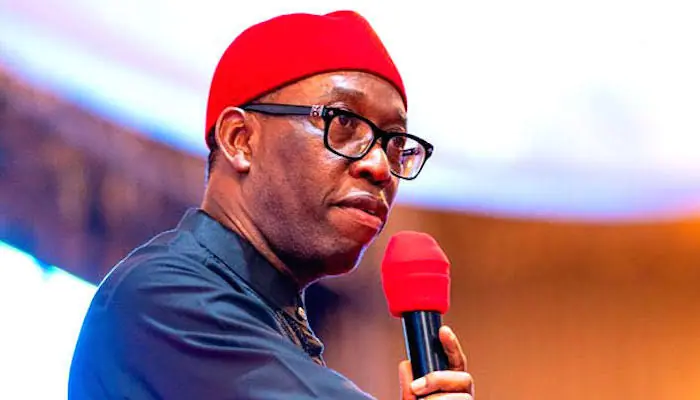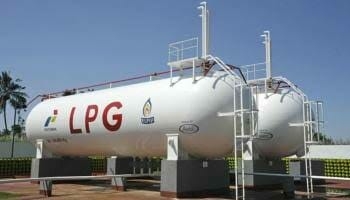Delta State Governor Ifeanyi Okowa has urged the Federal Government and relevant policymakers to take steps to reduce the country’s rising Liquefied Petroleum Gas (LPG) prices.
On Monday in Asaba, the governor made the call during a two-day LPG sensitization and awareness campaign organized by the National LPG Expansion Implementation Plan, Office of the Vice President, in collaboration with the State Government.
He stated that the campaign’s theme, “Stimulating Delta State Socioeconomic Growth Through LPG Adoption And Expansion,” was appropriate as the world moved toward greener energy sources.
This, he claims, is due to the negative effects of fossil fuels on the environment.
Okowa, through his Chief Economic Adviser, Dr Kingsley Emu, stated that stakeholders must work together to reduce the rising cost of LPG if the National LPG Expansion Plan is to be realized.

He thanked the Vice President’s Office for selecting Delta as one of the pilot states for the public enlightenment campaign.
“Recently, world leaders gathered in Glasgow, Ireland, for a Summit (COP-26) to discuss the negative effects of climate change caused by the use of fossil fuels, as well as the need to transition to cleaner energy.”
“This makes the adoption of LPG as a transition fuel to greener sources imperative, and Delta State is eager to play a vital role in this process and will provide maximum support to this awareness program,” he said.
Okowa stated that Delta is home to 40% of the nation’s natural gas endowments, implying that the state is home to a large number of oil and gas companies.
He stated that the state could benefit from the establishment of gas processing plants and gas-related industries.
According to the governor, this has implications for job creation, inclusive economic growth, and long-term development.
“However, as we adopt LPG as the fuel to power the economy’s socioeconomic activities, we must acknowledge a major challenge currently confronting the populace, the issue of high LPG market prices.” With the rate at which prices are rising, LPG is becoming increasingly out of reach for the middle class and the common man. The price increase has been attributed to a number of factors, including the reintroduction of VAT, the depreciation of the naira, and large imports of LPG in comparison to low domestic production.
“It is critical that policymakers find a way to mitigate this upward trend in LPG prices in order to provide relief to our people and achieve the goal of the LPG expansion plan,” he said.
Okowa was dissatisfied with most oil and gas companies’ continuous flaring of gas and urged them to expand their production facilities to include the capacity to convert gas to LPG for use.
He explained that this was due to the LPG market’s untapped potential.
The governor urged investors to enter the oil and gas sector and increase the market availability of LPG.
He stated that his administration had implemented significant reforms to create an investor-friendly environment in the state, such as tax harmonisation, easy access to land, and dispute resolution mechanisms to deal with conflicts as they arose.
“As we embrace the use of LPG as a source of energy in every sector of our economy, safety concerns become paramount.”
We must not forget the gas explosion incident at Agbor in January of this year, which tragically claimed many lives.
“As a government, we have put mechanisms in place to avoid similar occurrences, including the formation of a committee to advise the government on guidelines for the establishment of gas plants in the state,” said the governor.
Mr Dayo Adesina, Senior Special Assistant to the President on LPG, stated that Delta State was strategic to the National LPG Expansion plan due to its contributions to the country’s oil and gas development.
He stated that the federal government would purchase 10 million gas cylinders and distribute them to marketers for onward distribution to end users, who would be exchanged from various homes.
Adesina stated that there was no reason for anyone to use firewood, kerosene, or charcoal for cooking, especially since the country was endowed with an abundance of gas.
He praised Gov. Ifeanyi Okowa for establishing four training centers in the state for the production of low-emission stoves.
Earlier, in a welcome address, the State Commissioner for Oil and Gas, Prince Emmanuel Amgbaduba, stated that the goal of the sensitization was to demonstrate the economic and long-term plan for adopting LPG for domestic use, power generation, agriculture, and transportation, among other things.
He stated that using LPG for clean cooking would help to reduce deforestation, reduce ozone layer depletion, and increase revenue generation in the state.
The commissioner commended Okowa for approving an Annual Safety Sensitization Campaign for LPG Retailers in the State, with the first edition scheduled for 2020.
“With this new vista, oil companies are encouraged to diversify by converting waste to wealth instead of flaring gas.”
As the state prepares to embrace the new frontiers that this program intends to open, the government is cognizant of the associated safety risks, particularly when not handled properly.
“With the establishment of the Ministry of Monitoring and Compliance, all hands must be on deck to institute best global practices in keeping every resident of the State safe as we reiterate our resolve to adopt LPG as a transition fuel in the journey towards greener energy,” Amgbaduba said.
Mr Victor Asasa, Chairman of the Isoko South Local Government Council, has called for the establishment of a gas turbine power plant in Irri that would be powered by the gas flared in the area.
The event included paper presentations from oil and gas stakeholders, as well as an exhibition of locally manufactured low-emission stoves.

















Discussion about this post